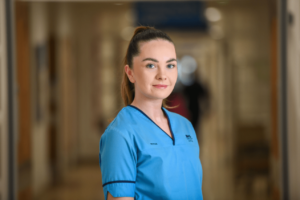Health and Social Care
Voices of community health and social care: Louise’s story
August 2, 2023 by healthsocialcare No Comments | Category National Care Service
Over the course of the past year, we have been up and down the country filming for our Voices campaign. We have heard from people who use and work in community health and social care, listening to their experiences and how this has shaped their hopes for the National Care Service.
Louise is a dietitian at University Hospital Wishaw.
Can you tell us about your role?
The job of a dietitian is to help people that are malnourished. The main patient group I work with are patients that have disease-related malnutrition. I specialise in upper GI oncology, so it’s mainly people with oesophageal, gastric and pancreatic cancer that I work with.
What type of support and treatment do you give your patients?
A lot of my patients have tumours in their oesophagus or their stomach so they can’t swallow much. We’ll start off with a liquid diet and move onto a feeding tube if necessary. I keep them nutritionally optimised all the way through their treatment until their tumours are removed. Some patients can go back to a completely normal diet after their surgery, but some get oesophagectomies or gastrectomies, which is the total or partial removal of the stomach or the oesophagus. That would have lifelong dietary changes, so I help them adapt to their new lifestyle.
I work with them from diagnosis, see them through their treatment and surgery, and then I follow up with them until we agree that they are at a point where they don’t need me anymore. I usually leave an open duty of care for them, so if they ever feel they need to come back to me they can re-refer through the GP or they can give me a phone any time because sometimes they do just have questions.
What do you find most rewarding about your job?
I like supporting my patients through their treatment and seeing them do well on the other side of it. We see food and drink as an enjoyment, we celebrate with food and drinks. If you can’t eat, that’s a huge social factor that’s now removed from your life and it must be difficult, so it’s important to support people through that. Sometimes people come in just feeling so helpless and they don’t realise the options we have available and how big an impact we can make. So that’s an amazing feeling, being able to help people like that.
What do you think works well in the current system?
In my current role I work at the hospital four days a week as part of a multidisciplinary oncology service where we see all the patients on the wards. This works really well for the patients, they can see the cancer specialist nurses, they can see the oncologist, they can see me. It’s a full service to help them get support where they need it.
What are the biggest challenges that you face?
I’d say not having enough staff. Currently I’m the only upper GI dietician for the whole of Lanarkshire and I’m the only dietician that covers inpatient and outpatient oncology. It’s a huge, huge caseload and trying to keep on top of it is very overwhelming. Sometimes my patients need extra support and there’s just not enough time in the day to see everybody. That’s very challenging, and obviously working in cancer care, sadly, not everybody makes it out the other side and that can be very difficult at times.
Why do you think there’s a shortage of staff in the area?
I don’t think many people know much about what dieticians do. There’s only three universities in Scotland that offer the course, they only take 30 students each year. So, there’s not too many people graduating from the course. I think that’s one of the one of the main barriers. We do struggle to recruit people.
What do you hope for from future improvement?
It would be amazing if the National Care Service was in place to provide long term care for these patients and support them in any way that they needed. We do everything that we can for patients when they are here in the acute setting with us, and we would hope that they could access that support lifelong.
A lot of my patients can find tube feeding very overwhelming and there’s a lack of support. We work Monday to Friday, so sometimes they don’t know where to go in the evening or at the weekend if their tube blocks. Imagine it happens on a Friday night and they’re not going to eat all weekend until I come back on Monday. More services in the community that patients could go to over the weekend when we’re not in, with dietitians or someone with specialist knowledge available would make a huge difference.
A lot of my patients come to me once it’s all over and their feeding tube is removed and they say they’d be happy to come in and chat to anyone currently going through what they did. It would be great if this kind of support was available in the community, because I don’t think there’s anything like that at the moment.
If you have experience of community health and social care, please register for our Lived Experience Experts Panel and help us design a National Care Service which meets the needs of everyone in Scotland.
We’re also hosting a series of in-person and online forums this summer as part of the development of the National Care Service. You can find out more information and how to register your place on gov.scot/ncs.
Tags: lived experience, national care service


Leave a comment
You must be logged in to post a comment.